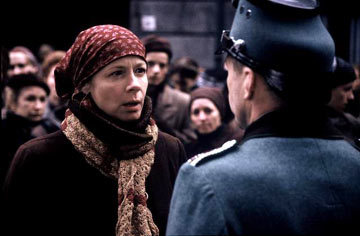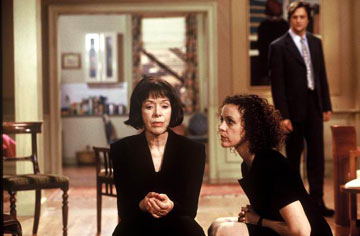

The movie Rosenstrasse is based on historical events during World War II where German women in mixed marriages took a stand against the Nazis, demand the return of their Jewish husbands. It's a rousing, moving story that the film doesn't really do justice to history, not because it is a bad movie but because it's kind of boring. This is primarily because the structure of the film unintentionally takes away much of the emotional impact of the events. Worse, at the end of the film there is a huge feeling of "huh, that's it?" both in terms of story and characterizations. Rosenstrasse takes place primarily in two time periods, the present and World War II Germany.
The death of Ruth Weinstein's (Jutta Lampe, The Possessed, The Distant Land) prompts her to undergo a radical change back towards Judaism. This is confusing for her daughter Hannah (Maria Schrader, I'm the Father, Aimee and Jaguar), especially since religion was never a part of their lives. Now, Ruth is practicing to the extreme, highly disapproving of Hannah's relationship with a non-Jew. Hannah learns from a relative that Ruth lived with a German family during the War, and came to the United States by herself. This is all new to Hannah, who decides to go to Germany to learn more about her mother, and in the process hopefully understand her better. She tracks down Lena Fischer (Doris Schade, Gameboy, After the Truth), now ninety years old.
For whatever reason, Hannah hides the fact that she is Ruth's daughter from Lena. There is no real purpose behind this, except possibly for the inevitable weepy crying scenes at the end of the film. Lena tells Hannah about her and Ruth in the dying days of World War II. Back then, Lena (Katja Riemann, Hamlet X, Girl) was a well-known pianist in a mixed marriage to Fabian Israel Fischer (Martin Feifel, Sass, The Stranger), a violinist. Lena came from an upper class family, which kept Fabian safe for a while, but he soon found himself locked away in a building full of other Jews. Lena stumbled upon a young Ruth (Svea Lohde, Dr. Cuddle). Her parents were taken, but she managed to escape. She reluctantly takes her in, becoming like a mother. Lena goes from office to office trying to figure out where Fabian is, and finally discovers he is being held in a building on Rosenstrasse. She and other German women gather outside, trying to catch a glimpse of their Jewish husbands. As time progresses, the number of women grow and become more vociferous.
And that is essentially all that happens. Director Margerethe von Trotta (The Promise, The Silence) has a long and distinguished career, but here, she and co-writer Pamela Katz (Two Women, Two Men, Bon Soir) really don't do much. They wanted to make a film celebrating the strength, determination and love of German women, and they have, but it's never gets that exciting. There are some fine performances from Riemann (who won a European Film Award for her role) and Schrader, but everything feels calculated to evoke emotion. Why is the elderly Ruth embracing her religion with a zeal missing for decades? It's not clear at the end. Hannah does gain a better understand of who her mother is, but von Trotta's framing sequence adds nothing to the film, and feels more like it was for the audience's benefit. If Rosenstrasse eliminated the present and took place completely in the past, it would be more emotional, taut, and (thankfully) shorter.